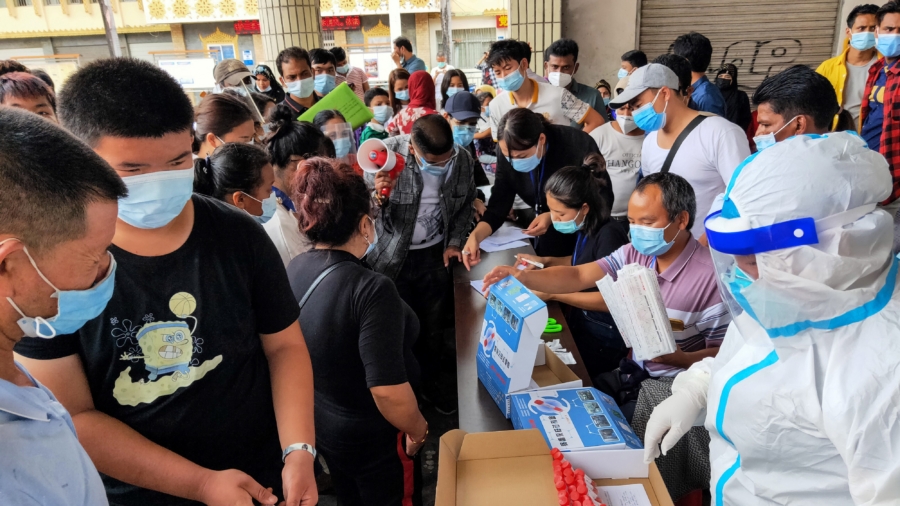Chinese authorities locked down Ruili city in southwestern Yunnan Province on Sept. 14, mandating that anyone who wants to enter or leave the city must apply for a special permit.
Yunnan governor Ruan Chengfa announced on Monday that regions that border Burma, Laos, and Vietnam have entered “wartime status” to prevent a further outbreak.
Authorities claimed that the lockdown was to prevent the CCP virus from spreading, after two people who illegally crossed the border from Burma to Ruili were diagnosed with COVID-19 on Sept. 13.
But a nearby city’s quarantine policy suggested that the outbreak was more severe than Ruili authorities let on.
Residents in Ruili told The Epoch Times in phone interviews that authorities suddenly installed iron bars to seal in their residential compounds and did not give them time to prepare for the lockdown.
“Now is the second day of the lockdown. I already can’t stand it. I feel very depressed. I lost my freedom. I’m very angry about being stuck here,” said Zhao Liang (pseudonym), who lives in the Aoxing Century II residential compound.
Authorities also tightened border control. On Sept. 14, they declared that a Ruili court sentenced three people to eight months imprisonment with a 5,000 yuan ($737) fine for illegally crossing the Burma-Yunnan border.
According to state-run mouthpiece People’s Daily, the three are Chinese nationals who went to Burma in April and crossed the border into Ruili several days later.
Although Ruili only reported two imported COVID-19 patients, the government of Tengchong—a nearby city that also borders Burma—announced on Tuesday that all people who arrived in Tengchong from Ruili after 10 p.m. Sept. 14 must go back to Ruili.
People who left Ruili between Sept. 12 and 10 p.m. Sept. 14 and arrived in Tengchong after Sept. 15, must pay for a nucleic acid test and self-quarantine at home, the government said.
“Chinese governments don’t report the true scale of an epidemic or other disasters. The fact that the Tengchong government rejected everybody from Ruili and Ruili city fully locked down—these indicate the outbreak in Ruili might be more severe,” said U.S.-based China affairs commentator Tang Jingyuan.

Lockdown
Ruili is home to about 210,000 people. It shares a 100-plus-miles border with Burma. People living on both sides of the border speak the same dialect. Many of them have family members living on both sides.
Much of Burma’s jade trade is shipped to China via Ruili, where there are many jade-processing factories and jade retailers.
Although the city government locked down the Aoxing Century I and Aoxing Century II residential compounds on Sept. 12 evening, it did not announce the latest COVID-19 patients until the morning of Sept. 14.
Xie Dapeng, mayor of Ruili, said at a press conference on Sept. 14 evening that 32-year-old Yang entered China with her three children and two nannies illegally on Sept. 3. All of them hold Burma passports. After arriving in Ruili, all six people lived in Yang’s big sister’s apartment, in the Aoxing Century I residential compound.
On Sept. 10, Yang lost her sense of smell and taste. Her sister took her to a hospital. Yang and the 16-year-old nanny Yi tested positive for COVID-19 on Sept. 12, and was formally diagnosed on Sept. 13.
At about 6 p.m. Saturday, authorities quickly sealed off the Aoxing Century I and Aoxing Century II residential compounds.
Xie said at the conference that all jade stores were closed at midnight Sept. 13, and the whole city was locked down on Monday. Only supermarkets, pharmacies, and open-air food markets can operate.
At the same time, all residents in Ruili were required to take nucleic acid tests.
Yang Mou, deputy mayor of Ruili, said at the preser that the city has 11 hospitals with a capacity to treat 1,540 patients in hospitals. The city designated Ruili Zhongdai Hospital as a dedicated COVID-19 treatment facility, which has 291 beds.
State-run broadcaster CCTV reported on Sept. 14 that Dali prefecture sent over 200 medical staff to Ruili, while Mang city sent 61 medical staff, to help treat patients.

Depressed Residents
“I was told that we [Ruili city] are on level-one alert!” said a business owner who lives in Aoxing Century I residential compound.
A jade businessman said there are roughly 100,000 to 200,000 people trading jade in Ruili every day. But now, all operations have ceased.
Another Ruili resident said her child studies in Mang city, located about an hour’s drive away. The school told the child to take a nucleic acid test and self-quarantine in the dorm.
The resident noted that her child did not return to Ruili recently, but was treated differently just because her family lives in Ruili.
Zhao Liang, a resident at Aoxing Century II, said: “We were told that the lockdown would be at least two weeks.”
Zhao said she and her neighbors took nucleic acid tests on Saturday and Sunday.
“They used iron bars to seal all the gates. Nobody can enter our residential compound,” Zhao said. “Being locked at home, I’m very depressed.”
She said local authorities asked all residents to deposit 1,000 yuan ($147.5) into a WeChat Pay account as credit. Then, the residential compound’s management team would use the credit to shop groceries for them.
Fearing reprisal from authorities, the interviewees chose to hide their names.
Chinese media Caixin reported on Tuesday that the lockdown caused food prices to increase dramatically in Ruili. And residents who lived in other compounds were also not allowed to leave their homes.
One city resident told Caixin that he went shopping for food at 2 a.m. on Monday after hearing about the lockdown. “Quickly, all vegetables and meat were sold out. The price of pork increased to more than 60 yuan per 500 gram (about $8.03 per pound),” the resident told Caixin.
In Yunnan, the average price of pork is 24 to 31 yuan per 500 grams, according to Chinese market reports.
From The Epoch Times


